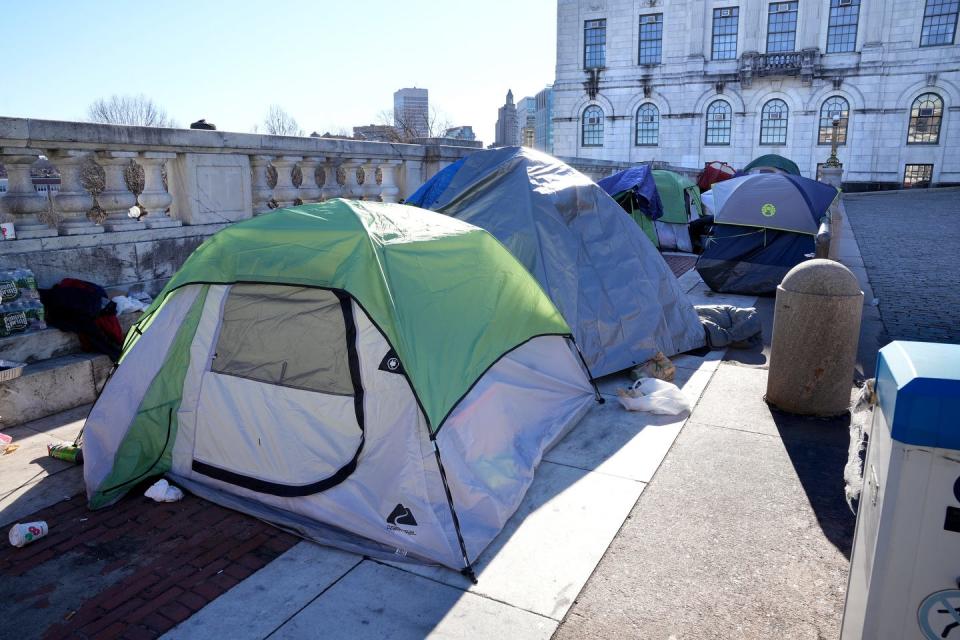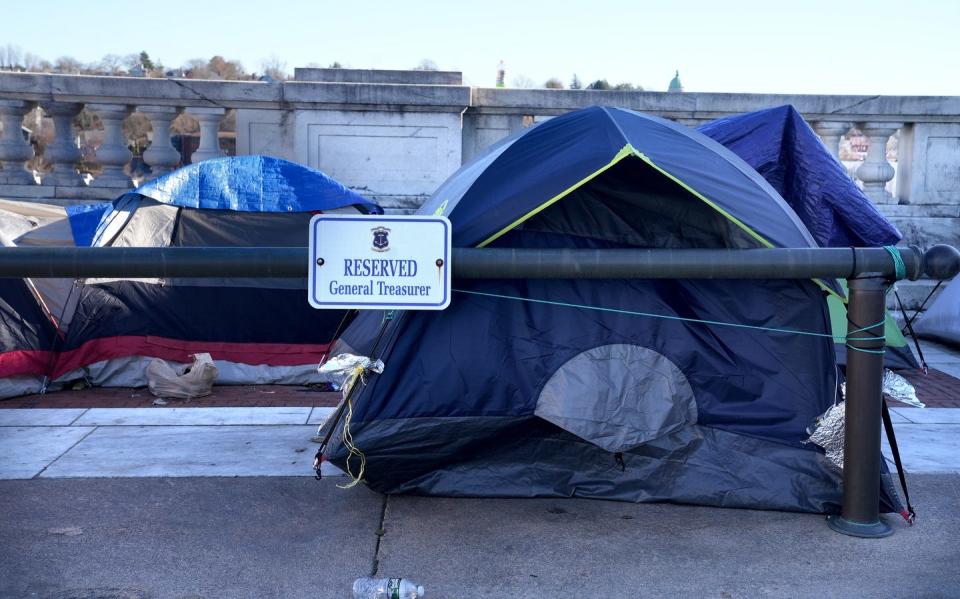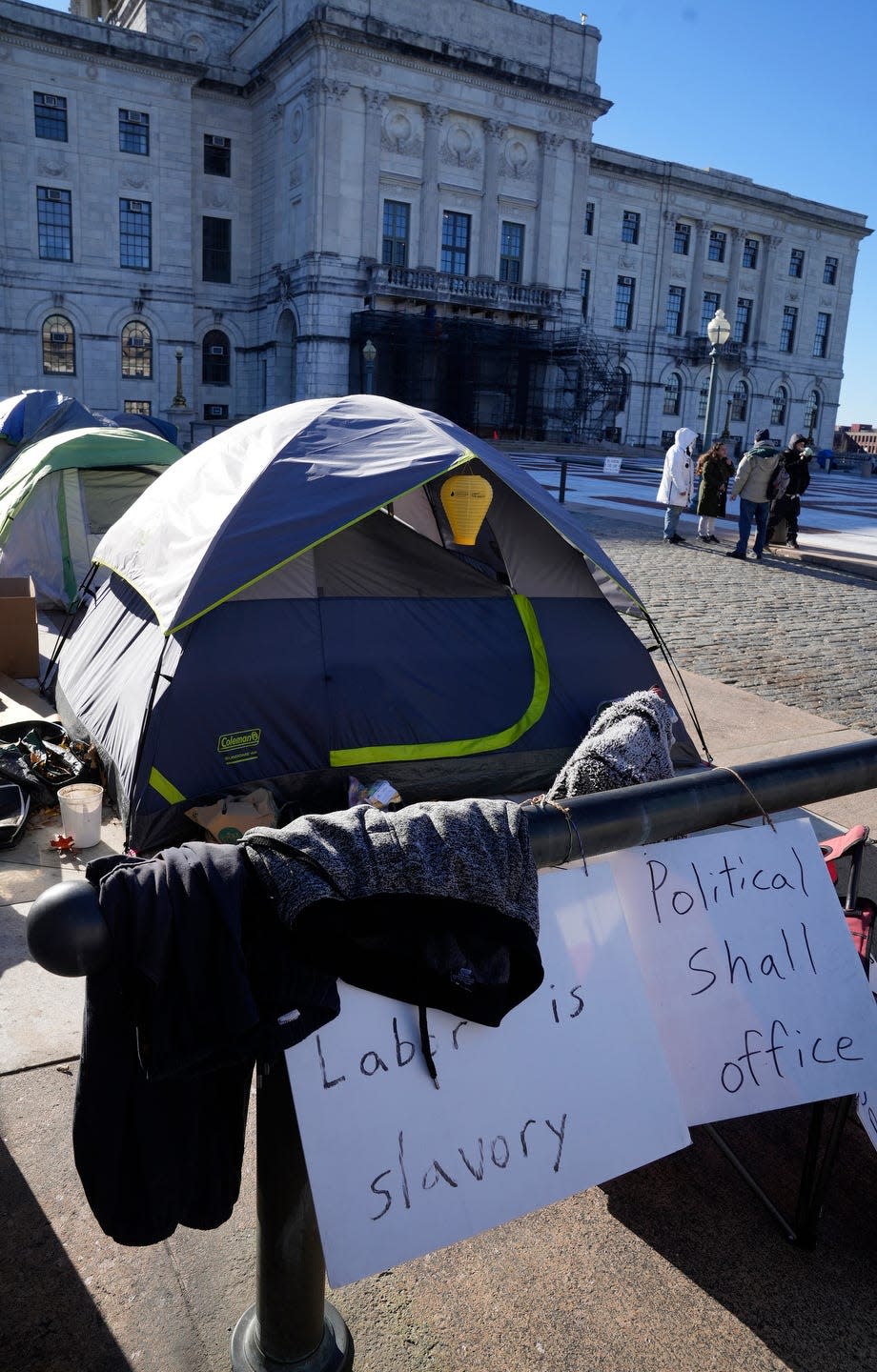RI judge says homeless tent encampment at State House can stay — for now
- Oops!Something went wrong.Please try again later.
PROVIDENCE – A tent village can remain at the front door of the Rhode Island State House until at least next week, a Superior Court judge said Friday, postponing Gov. Dan McKee's plans to clear an encampment his administration considers a safety hazard.
Judge David Cruise issued a temporary restraining order that blocks the state from removing the roughly 30 tents on the capitol's Smith Street entrance plaza until Wednesday, Dec. 14, when there will be another court hearing.
The order also prohibits anyone from setting up any new tents on the State House grounds.
A handful of homeless Rhode Islanders began living outside the State House in early autumn, and the number of tents grew steadily until McKee issued an eviction order, which was challenged in court late Thursday afternoon on free-speech grounds.

The McKee administration offered all residents of the tents a place in a temporary shelter, but advocates for the homeless say some of the shelter options do not meet the needs of couples, or people with disabilities or addiction.
Outside the courthouse, Robert Oliveira, who is working with the plaintiff's group, objected in particular to "barracks-style" beds offered at Emmanuel House in Providence.
The eviction letter delivered to the tents Wednesday morning said the State House plaza would be cleared on Friday at 9 a.m., and anyone who refused to leave would be subject to arrest.
But when 9 a.m. arrived Friday, with the court hearing slated to begin in 30 minutes, the tents remained and state troopers stationed at the scene made no attempt to clear them.
A story to hear:What is it like being homeless in Rhode Island? One family's story.
The motion filed Thursday to stop the eviction argues that the tent residents' "physical presence on the grounds of the Rhode Island State House is their method to express their 1st Amendment Rights."

The McKee administration argues that while the State House may be public property, the state determines the "time, place and manner" of political protest on that property.
"This situation has become a dangerous situation," Bart Totten, a lawyer with Adler Pollock & Sheehan representing the state, said at a hearing on the restraining order. "There are camps blocking both entrances on the sidewalks to the State House. There is garbage. There are no bathroom facilities. There have been observed hypodermic needles there. It has become a safety issue."
It is unclear how many people are still camped out at the State House each night and how many of the tents are still occupied.
Who's living in front of the State HouseAs tents line the State House plaza, we asked those living in them for their stories
Lawyer Richard Corley, who is representing the encampment residents in the case, said after the hearing he did not know exactly how many people were still there and that it could be anywhere from a dozen to more than 40 people.

With the time provided by the restraining order, Corley said, he hoped to be able to find living arrangements that the encampment residents can live with and can resolve the case outside of court.
"We now have a little bit of time ... to try to contact the state resources, to reach out to the head of housing to resolve this, see what funds are available to do that and speak to my clients to see what they are trying to do," he said. "They have raised public awareness by having this hearing, which was one of their goals."
Does he believe the state has the authority to prevent people from living on the State House grounds?
"That is somewhat an open question," he said. "The State House is owned by the state. The people it represents are the citizens of Rhode Island. My clients are citizens of Rhode Island. So there is an argument that my citizens are part owners of the grounds of the State House."
The American Civil Liberties Union of Rhode Island sent a letter to McKee opposing the removal of the tent encampment and warning of legal action.
Dozens of protesters of the McKee administration's handling of the situation gathered inside and outside the State House on Friday before the ruling came down.
"The goal of the court is to allow both sides to talk to give the state the opportunity. They said numerous times that they want to provide beds for these people and they say they have the beds," Cruise said, delivering the order. "Everyone wants the same resolution. That is certainly what the court wants."
While the encampment drama plays out, the McKee administration is still trying to open a 50-bed "warming station" at the Cranston Street Armory, but has so far been unable to find a nonprofit agency willing to run the site. It's latest deadline for provider proposals is Dec. 15.
Chris Raia, a spokesman for state Housing Secretary Josh Saal, said Friday that the Department of Housing "remains in communication" with possible shelter operators.
While they wait for a nonprofit operator, state agencies toured the Armory Friday and "delivered 50 cot-style beds, blankets, [personal protective equipment,] COVID-19 test kids and a hand-washing station to begin outfitting the site for its future use as a 24/7 warming center," Raia wrote in an email.
This article originally appeared on The Providence Journal: Judge rules RI State House homeless encampment can stay temporarily

